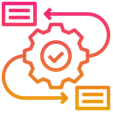Data automation offers an abundance of benefits for businesses, streamlining processes, improving accuracy, and empowering better decision-making. Here are some key advantages to consider:
Enhanced Efficiency and Productivity:
- Repetitive tasks like data entry, report generation, and data cleansing can be automated, freeing up valuable employee time for more strategic analysis and tasks requiring human expertise.
Optimized Speed through AI Automation:
- Implement AI-driven data automation solutions to reduce manual data handling, accelerate processes, and minimize error rates. AI Automation tools enable real-time data processing, offering immediate insights and enhancing operational agility.
Improved Data Quality and Accuracy:
- Manual data entry is prone to errors. Automation minimises human error, ensuring data consistency and accuracy across various systems.
Reduced Operational Costs:
- Automating manual tasks reduces labour costs associated with data management.
Better Decision-Making:
- Faster access to accurate and reliable data allows for data-driven decision making.
Increased Scalability and Agility:
- Automated data pipelines can easily handle growing data volumes, allowing businesses to scale their operations efficiently.
Pangaea X: Your Bridge to Data Automation Projects
Empowering Businesses, Empowering Freelancers
Benefits for Businesses:
- Access Top Talent: Find pre-vetted freelance data automation engineers with the expertise to tackle your specific challenges.
- Reduced Costs: Automate repetitive tasks and free up your internal resources for higher-value activities.
- Improved Efficiency: Streamline data pipelines and gain faster access to actionable insights.
- Enhanced Data Quality: Reduce manual errors and ensure data consistency across your systems.
- Scalability and Agility: Easily adapt your data workflows to meet evolving business needs.
- Business Growth through AI Analytics:Integrate AI analytics to perform adaptive analysis and gain predictive insights, enhancing decision-making and strategic moves.
Benefits for Freelancers:
- Find Lucrative Projects: Connect with businesses seeking your data automation expertise.
- Streamlined Workflow: Utilise project management tools and secure payment processing.
- Build Credibility: Showcase your skills and experience to a network of potential clients.
- Stay Ahead of the Curve: Access potential learning resources to stay updated on the latest trends.
- Collaboration Opportunities: Connect with other freelancers for complex projects or knowledge sharing.
- AI-powered data automation projects:Pangaea X provides opportunities to work on AI-powered data automation projects that match your skills.
Pangaea X is the bridge between your data automation needs and the perfect solution.
Related Article

Quality & Verified Talent

Project Matching Expertise

Streamlined Workflow

Cost-Effectiveness

Scalability and Flexibility
- Employment Model: There are three main options: full-time employee, contractor, or freelancer. Typically, full-time employees will be the most expensive option due to salary, benefits, and overhead costs. Freelancers may be the most affordable option, with contractors falling somewhere in between.
- Experience Level: Automation Engineers with more experience and specialised skills will command a higher salary or rate.
- Location: Engineers in areas with a high cost of living will likely have higher salaries than those in lower cost of living areas.
- Industry: Certain industries, like tech or finance, may be willing to pay more for Automation Engineers due to the high demand and impact they can have.
Technical Skills:
- Programming Languages: Proficiency in scripting languages like Python is essential. Familiarity with SQL for data manipulation and retrieval is crucial. Depending on the role, experience with Java, R, or Scala could be beneficial.
- Data Automation Tools: Experience with ETL/ELT tools (Extract, Transform, Load/Extract, Load, Transform) is a big plus. Knowledge of data integration platforms and cloud-based automation services like AWS Glue or Azure Data Factory is valuable.
- Data Warehousing and Databases: Understanding of data warehousing concepts and experience with popular databases like MySQL, PostgreSQL, or Snowflake is important.
- AI and Machine Learning Frameworks: Familiarity with integrating machine learning frameworks like TensorFlow, PyTorch, or scikit-learn into automation workflows is increasingly valuable. AI-driven automation tools for anomaly detection, optimization, or unstructured data processing can greatly enhance capabilities.
- Version Control Systems: Familiarity with Git for version control and collaboration is essential.
- Understanding of Data Pipelines: The ability to design, develop, and maintain data pipelines that efficiently move and transform data is key.
- Data Quality: A keen eye for data quality and the ability to implement data cleansing and validation techniques are important.
- Business Domain Knowledge: While not always required, familiarity with the specific industry or domain can be a significant advantage.
- AI-Driven Insights: Experience with AI tools to enhance automation, detect anomalies, or optimize workflows can add significant value.
- Analytical Thinking and Problem-Solving: Strong analytical skills to troubleshoot issues and identify areas for improvement within data workflows are essential.
Preparation
- Define Your Needs: Clearly outline the project scope, including tasks, required tools, and desired outcomes. This helps target qualified freelancers and tailor your interview questions.
- Craft a Compelling Job Posting: On freelance platforms or your website, describe the project, desired skills (refer to previous answer on skills to look for), and your timeline/budget.
- Review Profiles and Portfolios: Look for relevant experience in your industry or similar projects. Check for certifications in data automation tools or positive client feedback.
- Shortlist Based on Skills: Select freelancers who possess the programming languages, tools, and experience mentioned in your job posting.
- Initial Call or Video Conference: This is your chance to assess communication skills, cultural fit, and project understanding. Discuss the project details, deadlines, and their approach.
-
Technical Skill Assessment:
Evaluate technical proficiency. This could involve:
- Live Coding Challenge: Provide a small coding task related to data automation to assess their problem-solving skills and coding style.
- Portfolio Review: Discuss specific projects in their portfolio that demonstrate relevant skills and tools used.
-
In-Depth Interview:
Ask detailed questions about their experience:
- Process for Designing Data Pipelines: How do they approach building automated data workflows?
- Data Quality Management: How do they handle and ensure data quality within pipelines?
- Experience with Specific Tools: Probe their experience with the tools mentioned in your project requirements.
- Project Management Skills: How do they manage their time and communicate progress with clients?
- Experience Level: Engineers with more experience and specialised skills will command a higher rate.
- Location: Rates may be higher in areas with a high cost of living.
- Project Complexity: Complex projects requiring specialised tools or in-depth data expertise will likely cost more.
- Platform: Freelance marketplaces may have fees or take a percentage of the freelancer's rate.
Here's a general range for freelance data automation engineer rates:
- Low-end: $35 per hour (This might be possible on freelance platforms, but the engineer's experience or location may be a factor)
- Mid-range: $50 - $100 per hour (This is a more common range for mid-level freelancers with good experience)
- High-end: $100+ per hour (Highly experienced or specialized freelancers may command rates in this range)
Project Scope and Deliverables:
- Clearly outline the project goals, tasks involved, and expected outcomes.
- Define specific deliverables, including deadlines and file formats.
- Include details about any data sources, tools, or platforms required for the project.
- Specify the payment method (e.g., hourly rate, fixed project fee).
- Define payment milestones linked to project deliverables.
- Outline late payment penalties (if applicable).
- Clearly state who owns the intellectual property rights created during the project (source code, data pipelines).
- If you require ownership, consider offering the freelancer a buyout clause.
- Include a non-disclosure agreement (NDA) to protect sensitive information shared during the project.
- Specify data security protocols the freelancer must follow, especially if handling sensitive data.
- Define the conditions under which either party can terminate the contract (e.g., missed deadlines, breach of NDA).
- Outline the process for termination and any associated fees.
- Specify a method for resolving any disagreements arising during the project (e.g., mediation, arbitration).
- Project Management: Outline communication channels (e.g., email, project management tools) and meeting schedules.
- Acceptance Criteria: Define how you will approve completed deliverables.
- Warranties and Guarantees: Consider including limited warranties on the freelancer's work to ensure a certain level of quality.
- Use clear and concise language.
- Consult with a lawyer if you have any uncertainties regarding specific clauses.
- Both you and the freelancer should sign a copy of the final contract.
Get your data results fast and accelerate your business performance with the insights you need today.












